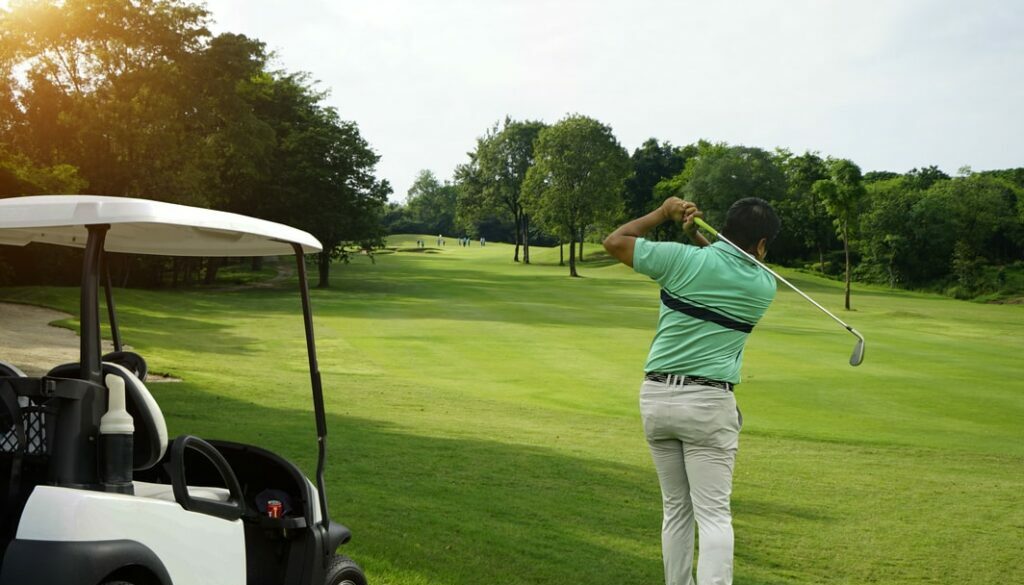What Is Golfer’s Elbow? And How Can Sports Medicine Help?
The Myrtle Beach/Horry County area is fortunate to have some of the best golf courses around. Now imagine you’re teed up and getting ready for the perfect swing…
…then suddenly, a searing pain shoots through your forearm.
If this is the case, you may have something called golfer’s elbow, and it’s a condition that our sports medicine specialists can treat.
But what is golfer’s elbow? We’ll examine the answer and look at how our sports medicine physicians can help get you back onto the greens in Horry County.
What is Golfer’s Elbow?
This is wrist, elbow and forearm pain that is caused by tiny tears in your medial common flexor tendon. The medical term for it is medial epicondylitis, and it’s a form of tendonitis. Golfer’s elbow isn’t limited to golfers; you can get it in any sport or activity that causes repetitive motion—even working on a computer keyboard. In fact, according to the Cleveland Clinic, around 90 percent of those with golfer’s elbow actually develop it through something other than sports.
You don’t want to let golfer’s elbow go untreated. In addition to hurting your game (and no one wants that!), it can cause permanent damage, limiting your range of motion. It can also result in permanent, chronic pain and a weak grip.
What Are the Symptoms of Golfer’s Elbow?
The most prevalent symptom of golfer’s elbow is a pain in your forearm and wrist. You may even find it uncomfortable to make a fist. Other symptoms include tingling, numbness and a weaker grip.
What Are Other Common Golf
While golfer’s elbow may get most of the attention, there are other common golf injuries of which you should be aware.
Back Pain/Injuries
You can blame your golf swing for this one. Over time it can lead to chronic back pain and minor back strains. This is one reason why it’s important to do stretching exercises and talk to one of our orthopedic specialists if you start having pain.
Knee Injuries
Strains and weakness can result in knee injuries—specifically, torn ligaments. However, it’s important to be aware that there are several different sources of knee pain that can come from repeatedly playing golf.
Rotator Cuff Damage
The repeated motion of a golf swing can result in tendinitis, bursitis and tears in the rotator cuff. You’ll notice this with pain in your upper shoulder during certain points in your golf swing. You may also experience pain at night because laying down can cause stretching and pulling of the rotator cuff. Extending your arms overhead can also cause pain.
Wrist Tendonitis
When your tendons swell due to wrist movement, the result is tendonitis. Typically, this can be easily treated.
Injuries to the Fingers and Hand
Did you know that the repeated blunt trauma that results from the swing making contact with the ball or another object can actually lead to broken or deformed bones? It is often caused by gripping the club. It can also cause a condition called hypothenar hammer syndrome (HHS). In HHS, the blood flow to the fingers is reduced.
What Is Sports Medicine and Why Is It Important?
Sports medicine is a medical specialty that focuses on treating athletic injuries typically caused by sports or exercise. It may surprise you to know that sports medicine physicians also focus on helping you remain healthy by teaching you how to prevent sports injuries in the first place.
While athletics is a main facet of sports medicine, it also helps those who have physically demanding jobs find safer ways to perform them.
Why Is Sports Medicine Important?
As we mentioned earlier, one of the reasons sports medicine is so important is that it focuses on preventative medicine in addition to treatment. By following your physician’s instructions, you help ensure that you’ll enjoy your favorite activities for years to come.
In addition, if sports injuries aren’t addressed early, they can gradually lead to more debilitating and serious conditions.
This means sports medicine is important for anyone who leads an active lifestyle, whether they’re a dedicated marathon runner, someone who just enjoys a brisk walk, or an avid golfer.
Conway Medical Center’s Sports Medicine Specialists Are Here to Help You
At Conway Medical Center, our sports medicine specialists concentrate on keeping you off the sideline and in the game, whether that means helping you perform better at a physically demanding job or protecting your elbow so you can continue to enjoy your golf game.
Our services include a full range of sports performance training and care, which involves diagnosis, prevention and treatment of non-operative sports-related injuries.
Want to learn more? Contact us for an appointment with one of our sports medicine specialists.




